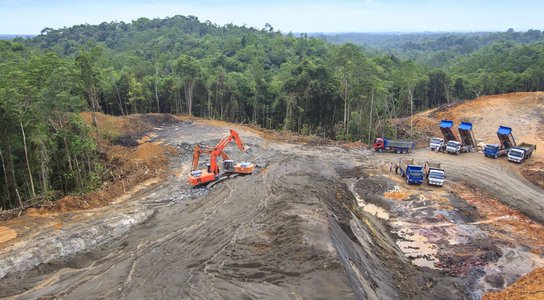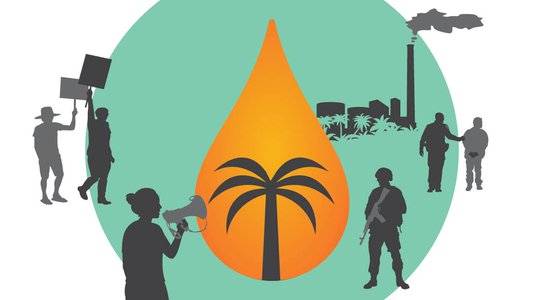The environmental footprint of big agribusiness is well-known. The industry is responsible for a third of global emissions and is the single biggest driver of deforestation. Now, our new investigation reveals the growing impact of industrial agriculture on human rights.
Traditional pastoralist communities have been sustainably managing land in Brazil’s Cerrado for centuries – but today, the community of Capão de Modesto in Bahia state face death threats, violence, and criminalisation, as powerful agricultural producers seek to forcibly evict them in order to continue growing environmentally damaging cash crops monocultures like soy and cotton.
Our investigation reveals that global commodity traders ADM, Bunge and Cargill are dealing in conflict-tainted soy sourced from these producers, and in doing so are contributing to this land conflict and alleged human rights abuses, in violation of their responsibilities under UN and OECD human rights standards.We resist because we need to remain in our territory. If we give up our land to them, what are we going to live off? - Juscelino Santos Britto, fecheiro from Brejo Verde community
- Download the full report : Seeds of Conflict (3.0 MB), pdf
Key findings
- Testimonies, legal and police records obtained by Global Witness demonstrate a campaign of intimidation against the traditional Capão de Modesto community and neighbouring fecho de pasto communities.
- Community members have faced death threats, arbitrary detention and destruction of community property that they allege were committed by employees of security agencies and other individuals hired by soy producers.
- Since 2017, these producers have sought to permanently evict the Capão do Modesto community. In a lawsuit, they characterise the community as ‘invaders’ and destroyers of the environment. To the community, eviction means the destruction of their ancestral way of life and certain destitution.
- Three of the ‘big four’ global grain-trading giants – ADM, Bunge and Cargill – have been trading with businesses that some of these producers own, Global Witness reveals in this investigation. These commercial relationships have persisted while the community was being harassed and threatened. Some of the soy from the farms concerned is shipped to Europe, including under a ‘sustainable’ carbon certification scheme recognised under EU biofuels rules.
Land conflict in the Cerrado
The Cerrado is a climate-critical carbon sink, covering about 2 million square kilometres – over 20 percent of Brazil – and is the second largest biome in South America after the Amazon. Yet the growth of industrial agriculture in regions like western Bahia has left the region with a reputation as the ‘Soy Frontier’.
Conflicts have proliferated with the frenzied grab for productive land in the booming agricultural belt, and traditional and indigenous communities are facing increased pressure, including from offsets. In this case, the farmers claim the contested area as ‘legal reserve’, forest areas that Brazilian law requires be preserved to offset deforestation for soy. Defenders like those in Capão de Modesto also face a growing range of threats to their ancestral lands and livelihoods, including violence and lawsuits.
Under justified and sustained international pressure to exclude deforestation from their supply chains, the traders are prioritizing purchases from established farms, but doing so with little regard for land rights conflict and human rights abuses.
As the dispute over this corner of western Bahia unfolds, commodity traders still operate in the area potentially still profiting from trading soy produced on farms that are forcing traditional communities into hardship.
While claiming almost universal traceability for Brazilian soy, none of the traders disclose any of their suppliers and the business remains fundamentally opaque and unaccountable. Despite policies supposedly committing the traders to uphold human and land rights in their supply chains, our investigation reveals longstanding structural deficiencies and negligence in policy implementation.
The traders, all of whom have European operations, also face growing regulatory risk as the European Commission moves ahead with new draft legislation to hold companies liable for their supply chains. International traders who operate in the EU may increasingly be open to litigation and enforcement procedures in the future for contributing to human rights and environmental harm.
Recommendations
Global Witness and others have repeatedly exposed ADM, Bunge and Cargill’s negative impact on climate-critical forests and on communities and land and environmental defenders, but the traders have failed to take sufficient meaningful action to date to clean up their supply chains.
- The Brazilian government must provide traditional communities in Brazil with recognised land titles to allow them to live in peace.
- In the absence of sufficient state protections, global commodity traders who deal in these conflict-prone areas must prioritise human rights and community land rights in their soy supply chains and provide remedy for harms where they occur.
- In the absence of credible corporate action, the European Union must ensure that Sustainable Corporate Governance legislation committed for 2021 mandates binding and enforceable human rights, land rights, and environment due diligence from agribusiness supply chain actors, and provides for sufficient penalties for non-compliance with due diligence obligations and actual harms. Separate EU legislation on forest risk commodities must equally ensure European markets are not tainted with human rights abuses and community land rights violations.

